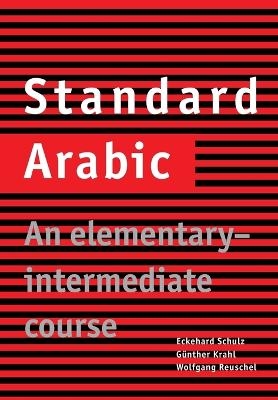
Standard Arabic
Cambridge University Press (Verlag)
978-0-521-77465-9 (ISBN)
This book presents a comprehensive foundation course for beginning students of written and spoken Modern Standard Arabic (MSA), providing an essential grounding for successful communication with speakers of the many colloquial varieties. This long-established and successful text has been completely revised with the needs of English-speaking learners especially in mind, and will prove invaluable to students and teachers alike. • Step-by-step guide to understanding written and spoken texts • Develops conversational ability as well as reading and writing skills • Arabic-English Glossary containing 2600 entries • Fresh texts and dialogues containing up-to-date data on the Middle East and North Africa • Includes Arab folklore, customs, proverbs, and short essays on contemporary topics • Grammatical terms also given in Arabic enabling students to attend language courses in Arab countries • Provides a wide variety of exercises and drills to reinforce grammar points, vocabulary learning and communicative strategies • Includes a key to the exercises • Accompanying cassettes are also available separately
Lesson 1. The alphabet (pronunciation and writing); Lesson 2. Article; Gender; The equational sentence; Agreement in gender; Lesson 3. Number; The personal pronoun; The noun and the adjective; The adjective; Lesson 4. Radical, root, pattern; The broken plural; Declension and nunation; Stress; Prepositions; Lesson 5. The perfect tense; The verbal sentence; The objective clause; The Nisba-ending; Lesson 6. The genitive construction; Affixed pronouns; Definiteness (summary); The adverb; Lesson 7. The imperfect tense; Demonstrative pronouns; Diptotes; Lesson 8. Subjunctive and jussive; The imperative; Negation; Lesson 9. The dual; The numerals 1 and 2; 'How much/many'; The names of the months; Lesson 10. Cardinal numerals; The year; Lesson 11. The perfect tense of verbs; Word order and the subject of the sentence; Lesson 12. The imperfect tense of verbs; Subjunctive and jussive of verbs; The imperative of verbs; The verbs; Lesson 13. Temporal auxiliary verbs; Lesson 14. Forms II, III and IV of the verb; The attributive relative clause; Lesson 15. Forms II, III and IV of verbs continued; The nominal relative clause; Lesson 16. Ordinal numbers; Dates; The time; Numeral adverbs; Fractional numbers; Numeral adverbs of reiteration; Decimal numbers; Lesson 17. Forms V and VI of the verb; Word order; Genitive constructions; Lesson 18. Forms VII, VIII and X of the verb; Lesson 19. The passive voice; About the construction of doubly transitive verbs; Some characteristic features of the derived forms; Lesson 20. The collective; Names of nationalities; The feminine Nisba; Lesson 21. The participle; Patterns of the participle; The usage of the participles; Shortened relative clauses; The participle as predicate; The False Idafa; Participles and adjectives as 1st or 2nd term of the Idafa; Impersonal expressions; Lesson 22. The infinitive; The use; The infinitive instead of a subordinate clause; Functional verbs; Functional verbs instead of passive constructions; Adverb and adverbial constructions; The usage; The cognate accusative; Lesson 23. Subordinate clauses: a survey; Temporal clauses; Lesson 24. Verbs R2=R3; Verbs with Hamza; The spelling of Hamza; Clauses of reason; Lesson 25. The pattern; The elative as positive; The elative as comparative; The elative as superlative; Common elatives; Specification; Lesson 26. Conditional sentences; The real conditional sentence; The unreal conditional sentence; The concessive clause; Lesson 27. Exceptives; Other exceptive particles; Diminutives; Lesson 28. The Hal-accusative; The Hal-clause; Survey of use of the accusative; Exclamations in the accusative.
| Erscheint lt. Verlag | 10.8.2000 |
|---|---|
| Zusatzinfo | Worked examples or Exercises |
| Verlagsort | Cambridge |
| Sprache | englisch |
| Maße | 174 x 248 mm |
| Gewicht | 1280 g |
| Themenwelt | Schulbuch / Wörterbuch ► Erwachsenenbildung |
| Schulbuch / Wörterbuch ► Wörterbuch / Fremdsprachen | |
| Geisteswissenschaften ► Sprach- / Literaturwissenschaft ► Sprachwissenschaft | |
| ISBN-10 | 0-521-77465-9 / 0521774659 |
| ISBN-13 | 978-0-521-77465-9 / 9780521774659 |
| Zustand | Neuware |
| Haben Sie eine Frage zum Produkt? |
aus dem Bereich


